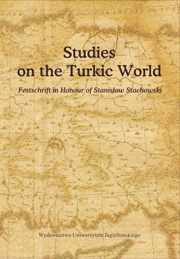Book contents
- Frontmatter
- Tabula Gratulatoria
- Contents
- Prezento de la scienca agado de prof. d-ro habil. Stanislao Stachowski
- Publications of Prof. Stanisław Stachowski
- Articles
- Bulgars and Slavs: Phonetic Features in Early Loanwords
- The Consonants ž ˜ ǧ in Kazakh
- Überlegungen zum Problem von Sprachtabus im Alttürkischen
- On the Expression of (ä)dgü kört(ä)či s(ä)n on the Bilgä Kagan Inscription
- On the Iranian Honorific Title bag, baγ, bay ‘lord, prince’
- Proto-Turkic Causative in *-g-?
- Relations entre les titres turcs qaγan, qan, qaγatun, qatun
- North-Western and Eastern Karaim Features in a Manuscript Found in Łuck
- The Importance of Bernardino Pianzola's Work for Turkish Lexicography
- Osmanische Einflüsse auf das Krim-Areal
- Turkish Proverbs in A Grammar of the Turkish Language by Thomas Vaughan (1709)
- Türk Dillerinde çilek ve yilek
- On First Syllable Reduplications in Karaim
- Names of Animals in Armeno-Kipchak: A New List Brought to Light
- Zum historisch-kulturellen Hintergrund der jenissejisch-türkischen Wortparallelen
- A New Fragment of the Mañjuśrīnāmasaṃgīti in Old Uyghur
- Ḳıṣaṣ-ı Enbiyā'dan. Eski Anadolu Türkçesinin Sözvarlığına Katkılar II
- Gezi Edebiyatının Öneminde Ahmet İhsan ve Şerafeddin Mağmumi'nin Yeri
- Das türkische Vaterunser in syrischer Schrift
- Invitation to Discussion
North-Western and Eastern Karaim Features in a Manuscript Found in Łuck
from Articles
Published online by Cambridge University Press: 05 September 2014
- Frontmatter
- Tabula Gratulatoria
- Contents
- Prezento de la scienca agado de prof. d-ro habil. Stanislao Stachowski
- Publications of Prof. Stanisław Stachowski
- Articles
- Bulgars and Slavs: Phonetic Features in Early Loanwords
- The Consonants ž ˜ ǧ in Kazakh
- Überlegungen zum Problem von Sprachtabus im Alttürkischen
- On the Expression of (ä)dgü kört(ä)či s(ä)n on the Bilgä Kagan Inscription
- On the Iranian Honorific Title bag, baγ, bay ‘lord, prince’
- Proto-Turkic Causative in *-g-?
- Relations entre les titres turcs qaγan, qan, qaγatun, qatun
- North-Western and Eastern Karaim Features in a Manuscript Found in Łuck
- The Importance of Bernardino Pianzola's Work for Turkish Lexicography
- Osmanische Einflüsse auf das Krim-Areal
- Turkish Proverbs in A Grammar of the Turkish Language by Thomas Vaughan (1709)
- Türk Dillerinde çilek ve yilek
- On First Syllable Reduplications in Karaim
- Names of Animals in Armeno-Kipchak: A New List Brought to Light
- Zum historisch-kulturellen Hintergrund der jenissejisch-türkischen Wortparallelen
- A New Fragment of the Mañjuśrīnāmasaṃgīti in Old Uyghur
- Ḳıṣaṣ-ı Enbiyā'dan. Eski Anadolu Türkçesinin Sözvarlığına Katkılar II
- Gezi Edebiyatının Öneminde Ahmet İhsan ve Şerafeddin Mağmumi'nin Yeri
- Das türkische Vaterunser in syrischer Schrift
- Invitation to Discussion
Summary
I. Preliminary remarks
As reported in Mardkowicz (1933b), a considerable part of the Karaim manuscripts stored in the loft of the kenesa in Łuck until the First World War were destroyed during the war and the Russian Revolution in 1917. Luckily for us, some of those manuscripts, mostly private letters and circulars, after having been stored and partly edited in 1933 by Aleksander Mardkowicz, ended up in a private collection and have survived in almost perfect condition to this day.
The majority of the surviving manuscripts is written in Hebrew semicursive script - most of them in the Łuck subdialect of Łuck-Halicz Karaim (hereinafter called, for the sake of brevity, the Łuck Karaim dialect), a smaller part of the collection being written in Troki Karaim. Even though some of the manuscripts display glosses from other dialects, the reader normally has no particular difficulty classifying the manuscript from the linguistic point of view. They are going to be presented in the near future in another, more extensive study. The collection, however, contains a document of which we cannot be entirely sure which dialect some of its fragments represent. As it exhibits a number of interesting features, including traces of far-reaching dialect mingling, it undoubtedly deserves a separate presentation.
II. Description of the manuscript
The manuscript is part of Józef Sulimowicz's (1913–1973) collection and can be found under the catalogue number 50II (see the upper-right corner of the sheet).
- Type
- Chapter
- Information
- Studies on the Turkic WorldA Festschrift in Honor of Stanisław Stachowski, pp. 75 - 94Publisher: Jagiellonian University PressPrint publication year: 2010



